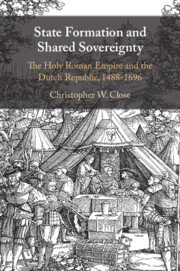Book contents
- State Formation and Shared Sovereignty
- State Formation and Shared Sovereignty
- Copyright page
- Contents
- Maps
- Acknowledgments
- Abbreviations
- Maps
- Introduction
- 1 The Swabian League and the Politics of Alliance (1488–1534)
- 2 Alliances and the Early Reformation (1526–1545)
- 3 Alliances and New Visions for the Empire and the Low Countries (1540–1556)
- 4 Shared Sovereignty and Regional Peace (1552–1567)
- 5 Shared Sovereignty and Multi-confessionality in the Empire and the Low Countries (1566–1609)
- 6 Religious Alliance and the Legacy of Past Leagues (1591–1613)
- 7 Religious Alliance and the Thirty Years’ War (1610–1632)
- 8 Westphalia and Politics of Alliance in the Empire and the Dutch Republic (1631–1696)
- Conclusion
- Bibliography
- Index
8 - Westphalia and Politics of Alliance in the Empire and the Dutch Republic (1631–1696)
Published online by Cambridge University Press: 02 March 2021
- State Formation and Shared Sovereignty
- State Formation and Shared Sovereignty
- Copyright page
- Contents
- Maps
- Acknowledgments
- Abbreviations
- Maps
- Introduction
- 1 The Swabian League and the Politics of Alliance (1488–1534)
- 2 Alliances and the Early Reformation (1526–1545)
- 3 Alliances and New Visions for the Empire and the Low Countries (1540–1556)
- 4 Shared Sovereignty and Regional Peace (1552–1567)
- 5 Shared Sovereignty and Multi-confessionality in the Empire and the Low Countries (1566–1609)
- 6 Religious Alliance and the Legacy of Past Leagues (1591–1613)
- 7 Religious Alliance and the Thirty Years’ War (1610–1632)
- 8 Westphalia and Politics of Alliance in the Empire and the Dutch Republic (1631–1696)
- Conclusion
- Bibliography
- Index
Summary
Chapter 8 details the on-going importance of the politics of alliance before and after the 1648 Peace of Westphalia. In the Empire, the organization of alliances shifted in the second half of the seventeenth century, as the principles of corporate alliance migrated into princely military leagues like the 1658 Rhenish Alliance and large-scale associations among Imperial Circles. Despite their different structures, both the military alliances and Circle Associations adopted the rhetoric of earlier leagues and mirrored their goals. Related processes played out in the United Provinces, where the decades after Westphalia witnessed a running debate over what form the Dutch state should take. At the heart of this conflict sat competing ideas about the Union of Utrecht. The Union served as a focal point for all kinds of proposals about the Dutch Republic’s operation. One of the few things that each side agreed on was the Union’s centrality. Accordingly, the development of the Dutch state during this period was inseparable from struggles over the Union’s meaning. By examining Westphalia’s legacy in both the Empire and United Provinces, this chapter traces the lasting influence of the politics of alliance on northern Europe’s political systems into the late seventeenth century and beyond.
Keywords
- Type
- Chapter
- Information
- State Formation and Shared SovereigntyThe Holy Roman Empire and the Dutch Republic, 1488–1690, pp. 287 - 328Publisher: Cambridge University PressPrint publication year: 2021



